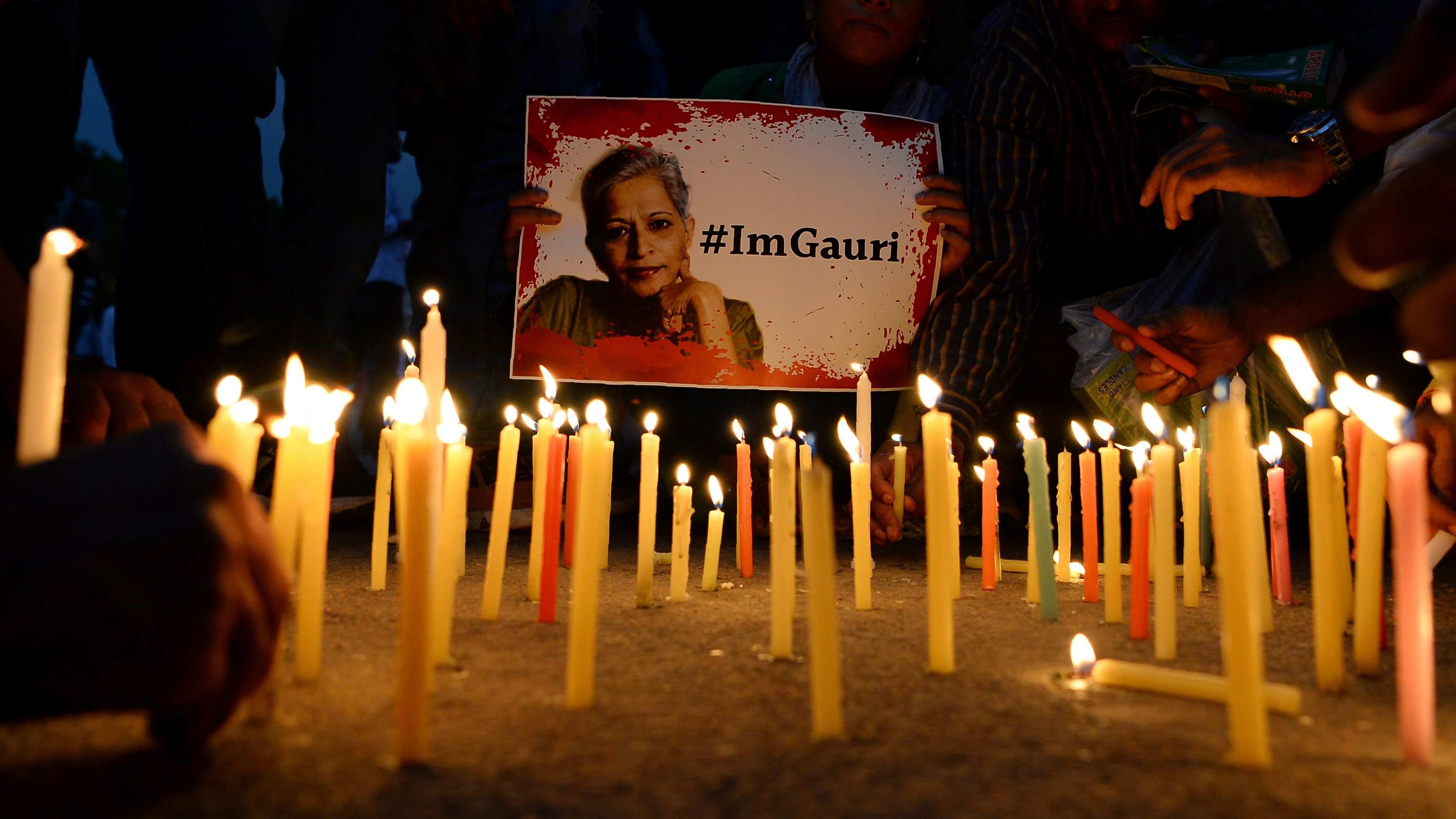A brutal murder of a journalist in India, which was subsequently cheered by right-wing trolls on social media, has sparked vociferous debates about journalistic freedom in a country that prides itself as the world’s largest democracy.
Indian Prime Minister Narendra Modi too has come under fire for keeping mum on the attack while following some of those Twitter trolls who posted spiteful and abusive messages on the microblogging site rejoicing over the journalist’s death.
Journalist-activist Gauri Lankesh, a known critic of right-wing Hindu-nationalistic extremism, was shot dead on Tuesday by unknown assailants outside her home in Bengaluru, the capital of India’s southern Karnataka state.
Lankesh was the publisher of the weekly Gauri Lankesh Patrike in her native language Kannada. Her death was met with shock and outrage, with journalists, politicians, and activists strongly condemning the murder. Several protest meets have been held in scores of cities across the country.
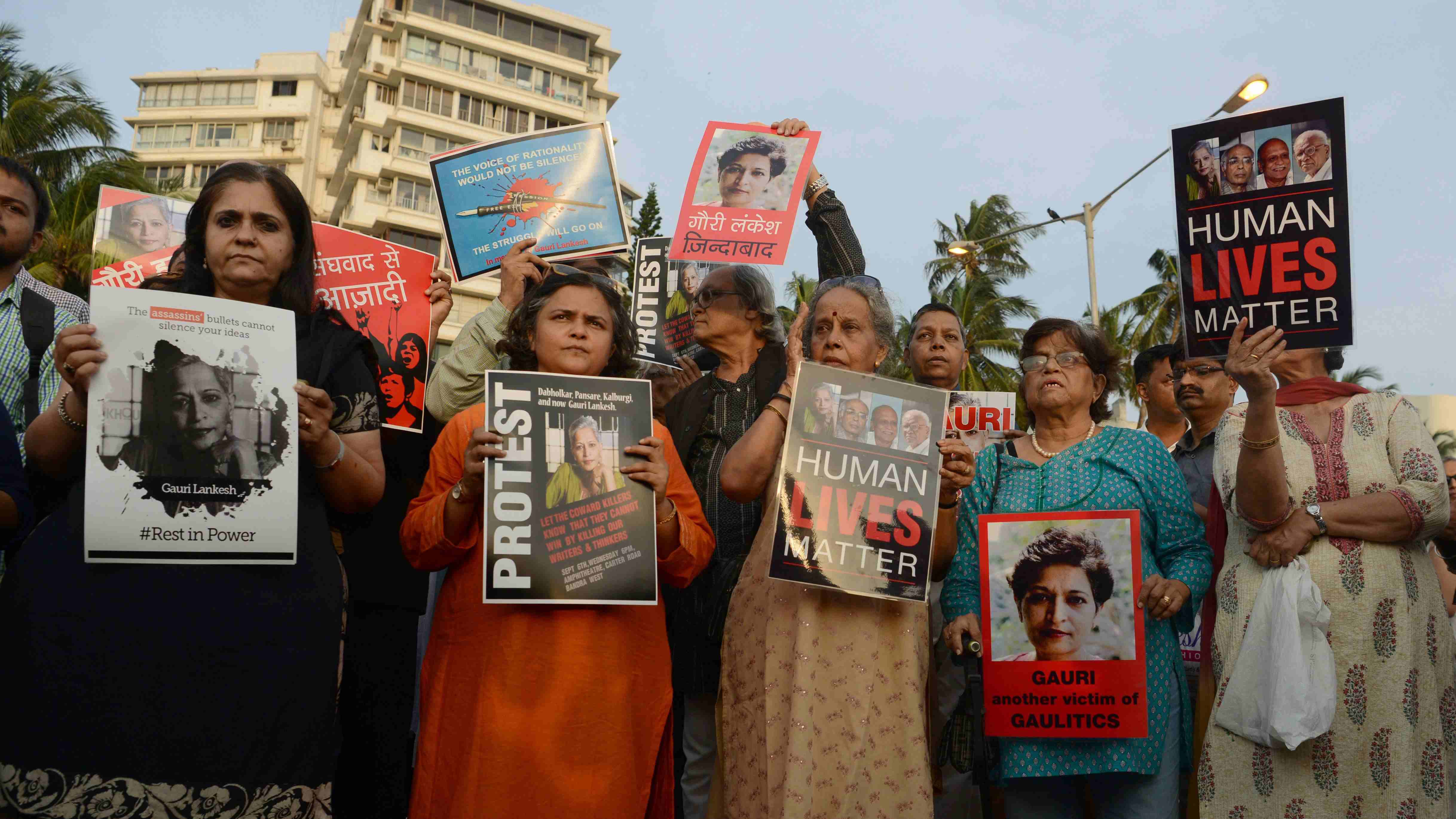
Indian protesters hold placards during a rally condemning the killing of journalist Gauri Lankesh, in Mumbai on September 6, 2017. / AFP Photo
Indian protesters hold placards during a rally condemning the killing of journalist Gauri Lankesh, in Mumbai on September 6, 2017. / AFP Photo
Ominous political message
Journalists, in particular, are worried about the ominous political message that the murder possibly implied. Some consider it an attack on the freedom of the press.
"Gauri Lankesh's gruesome murder has been the most chilling reminder yet about what could happen to journalists, who dare to criticize the ideologies of right-wing militant Hindutva in India," Rifat Jawaid, founder of online news portal JantaKaReporter, told CGTN.
"Lankesh's assassination is a warning to every independent and fearless journalist in India that he or she could very well be the next target if they do not stop holding politicians, particularly from the Hindutva brigade, to account," added Jawaid.
At a solidarity meeting at the Press Club of India in New Delhi on Wednesday, senior journalist Barkha Dutt spoke about the need to stick together in a difficult political climate.
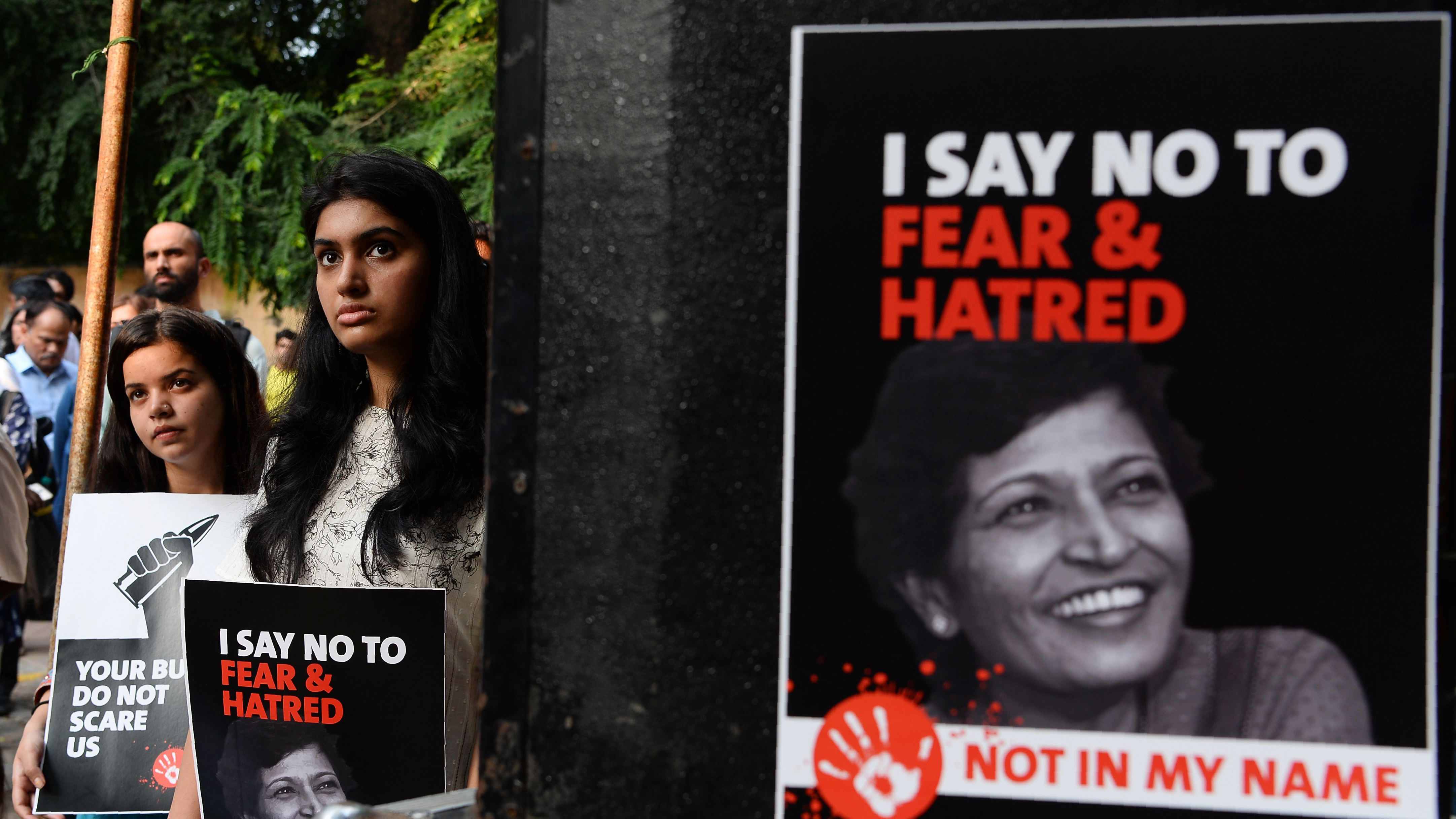
Indian demonstrators hold placards with the picture of murdered journalist Gauri Lankesh during a 'Not In My Name' protest in New Delhi on September 7, 2017. / AFP Photo
Indian demonstrators hold placards with the picture of murdered journalist Gauri Lankesh during a 'Not In My Name' protest in New Delhi on September 7, 2017. / AFP Photo
"Earlier this year I was called to speak at an international conference where I was asked to speak on the question: Are journalists under siege everywhere? I was put on a panel with journalists from Russia and Turkey. ‘At least we're not getting killed’, I had said back then,” she said. “I thought this morning I would have to revise my appraisal."
Siddharth Varadarajan, editor of the independent online magazine, The Wire, said: "Why was Gauri Lankesh targeted? Because she questioned."
Threats to other journalists are already being reported. Just days after Lankesh’s murder, Ravish Kumar, a well-known journalist, and anchor of NDTV’s Prime Time show revealed he is getting death threats on phone. "I am consulting my well-wishers, and I will take a final call on whether I shall register an official complaint accordingly," Kumar said.
Jawaid too admitted receiving threats which compromised the safety of his family. He felt that Lankesh’s murder may possibly dent independent journalism in the country. "I can't comment about others, but… I doubt we will be pursuing sensitive stories against the powerful in the government should we decide to not leave the country. My family says: 'Taking a bullet to protect the ethos of journalism is simply not worth it’," he said.
Disparaging tweet
What drew, even more, anger was the fact that just moments after the murder, many self-proclaimed "nationalists" and supporters of the ruling right-wing Bharatiya Janata Party (BJP) started celebrating the horrifying act on social media with some using disparaging remarks to describe the slain journalist.
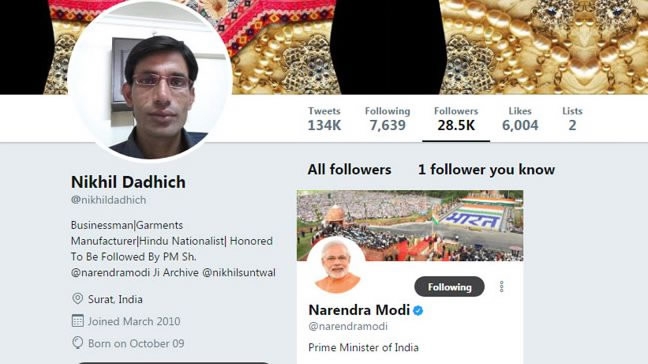
A screen shot of Twitter account @nikhildadhich shows it is followed by Indian Prime Minister Narendra Modi.
A screen shot of Twitter account @nikhildadhich shows it is followed by Indian Prime Minister Narendra Modi.
A particular Twitter account @nikhildadhich, which is followed by several political leaders from the BJP including Prime Minister Modi, drew widespread condemnation for the hateful message it sent out.
The tweet, written in Hindi, equated Lankesh to a “bitch”. The closest translation would read as: "A bitch met a dog's death, and all the puppies are now wailing in the same tune." The tweet was apparently deleted later.
"Is this a Hindu tradition to call someone a ‘bitch’ after she has died? A true Hindu mourns for 13-days when someone dies. It was not even 13-hours (after Lankesh’s death) and people had already started calling her ‘bitch’," an angry Ravish Kumar said.
Although many senior BJP leaders including government ministers have condemned Lankesh’s murder and the abusive messages on social media, Modi has so far remained silent on the matter. This has angered many, netizens and others, who are demanding the prime minister to unfollow accounts like @nikhildadhich.
"Modi follows such lumpen elements online and expects the world to respect him. The prime minister should rather follow us (journalists). Even if we criticize him, we do it within the limits of civility. He must remember that he is the leader of 1.3 billion Indian citizens," said Kumar. "And as citizens, we are within our rights to demand from our PM to tell us what are the compulsions for him to follow such people," he added.
The anger is evident on the microblogging site where a large number of users have started blocking Modi’s personal handle with #BlockNarendraModi appearing among top trends on Twitter since Wednesday. Modi is very active on Twitter and has nearly 34 million followers, which is second only to US President Donald Trump among global leaders.
Why does Modi follow trolls?
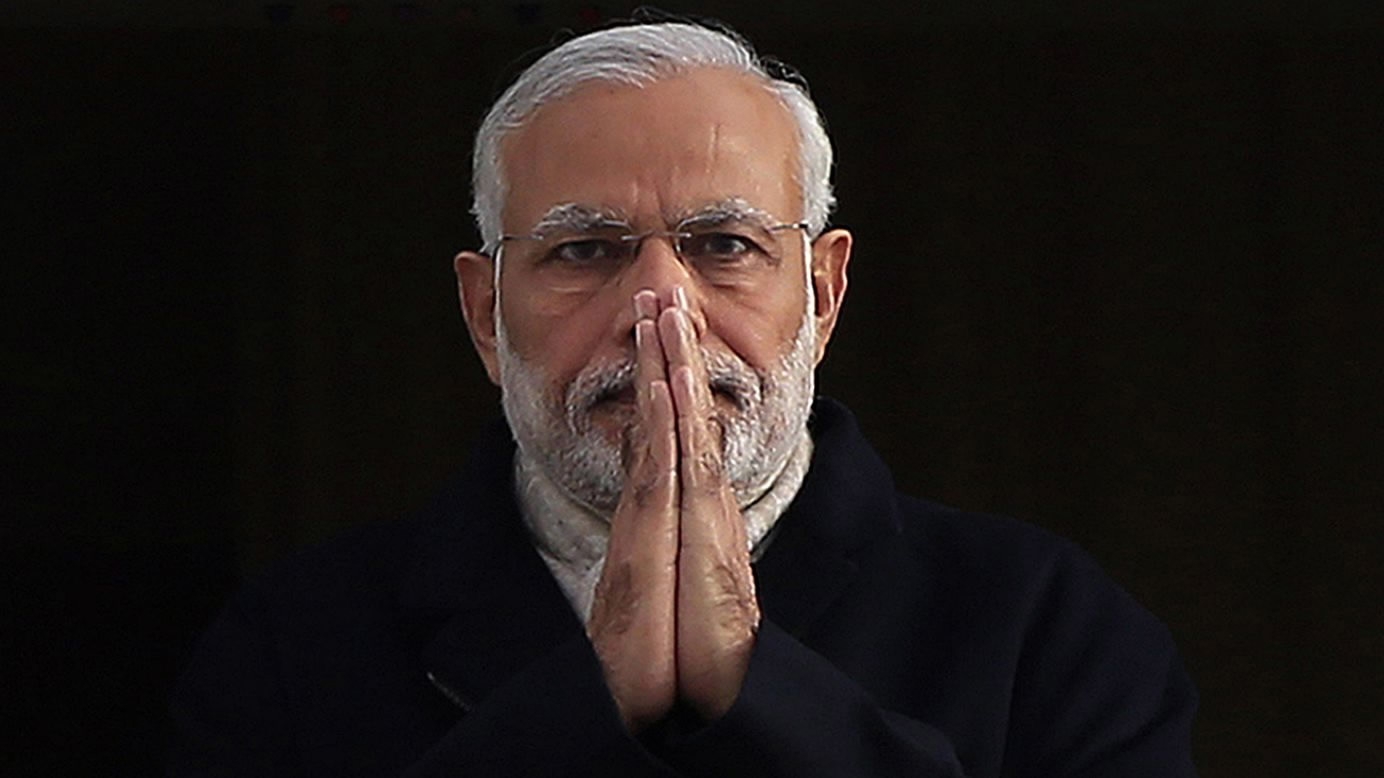
Indian Prime Minister Narendra Modi is very active on Twitter and has nearly 34 million followers. /AFP Photo
Indian Prime Minister Narendra Modi is very active on Twitter and has nearly 34 million followers. /AFP Photo
This is not the first time the Indian Prime Minister has come under fire for following trolls on Twitter. This February, Derek O’Brien of the opposition Trinamool Congress party accused Modi of encouraging online hatred and harassment through his choice of whom to follow.
"Twenty-six Twitter handles that give out rape threats, communal threats, are followed by the prime minister of India," O’Brien claimed in a speech to Indian parliament’s upper house, Rajya Sabha. The opposition leader also said that two of those accounts had been suspended by Twitter administrators.
"Modi is the only leader who follows trolls who give out vicious threats. In a democracy, it’s a frightening scenario when the Prime Minister is following those who dish out rape and death threats to women and men alike as if it is no big deal. Do you see any other [world] leader follow such accounts?" journalist Swati Chaturvedi, who has also authored "I Am a Troll: Inside the secret digital army of the BJP”, told CGTN.
Chaturvedi asserted that Modi’s right wing BJP party has incorporated trolls in an organized manner as part of a strategy that is unrivaled in any other political party. "BJP runs a well-oiled troll army in social media which uses the crassest of language to defend any dissent towards Modi, BJP or the right wing ideology. Every time someone says something unflattering, the next minute you see yourself being attacked by misplaced patriots and nationalists. The world that BJP has built on social media is bigoted," she said.
She felt that trolls have increased their attacks in recent years with tacit support from the ruling party and that Lankesh’s murder would only embolden them further. "We don't know who killed her but we can certainly see who are celebrating her death," she said.
Poor press freedom rankings
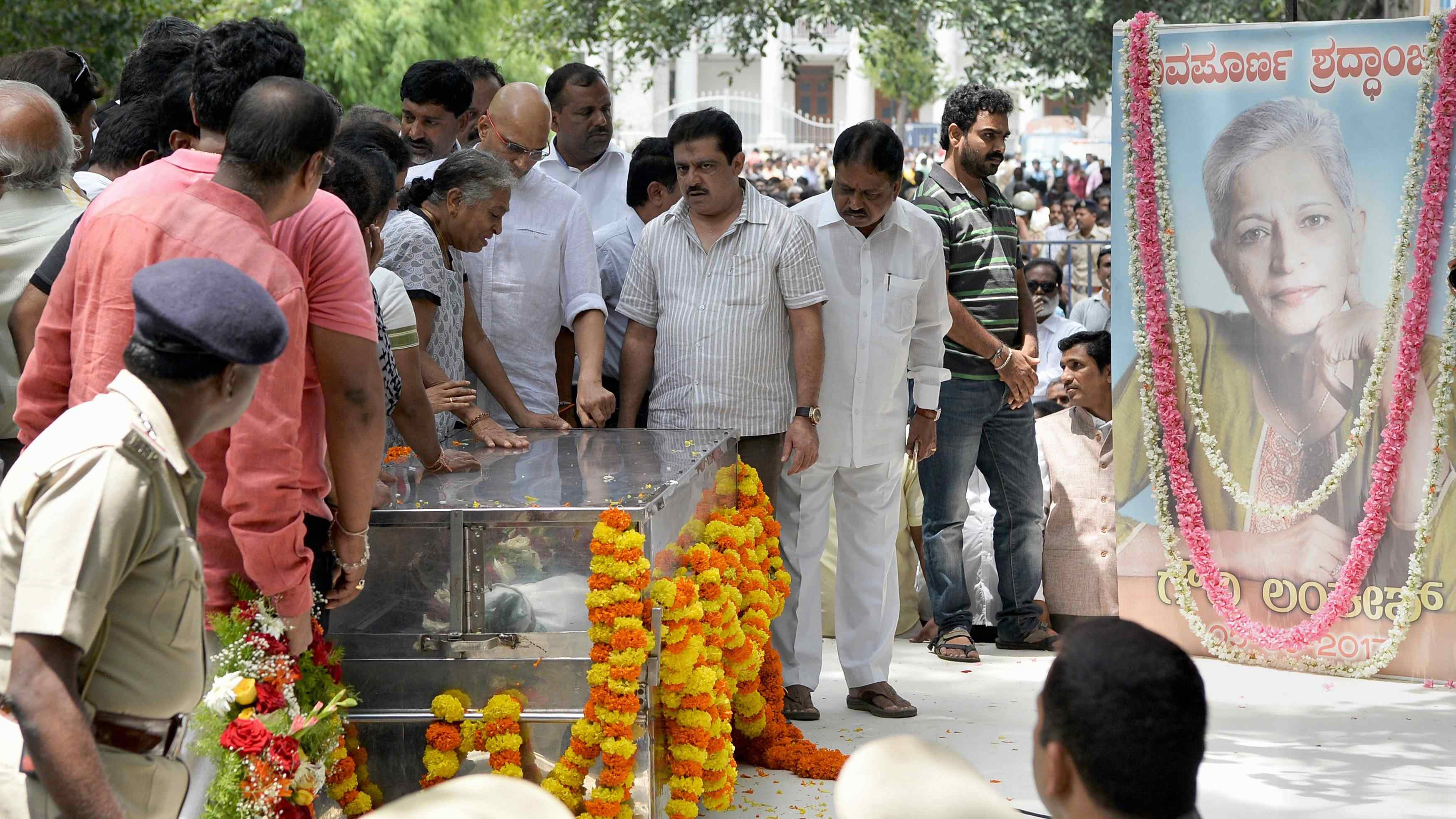
Relatives of Indian journalist Gauri Lankesh grieve by her body at the Ravindra Kalakshetra cultural centre in Bengaluru on September 6, 2017. /AFP Photo
Relatives of Indian journalist Gauri Lankesh grieve by her body at the Ravindra Kalakshetra cultural centre in Bengaluru on September 6, 2017. /AFP Photo
India slipped three places in the 2017 world press freedom rankings to 136th among 180 countries, the dismal performance blamed on "Modi’s nationalism" and growing "self-censorship" in the mainstream media.
"Real journalism is to report what authorities don’t want you to know, rest is all PR (public relations). Most of the media have become cheerleaders. The problem with this government is that they don’t like a free media. Top ministers call journalists ‘presstitutes’, even Modi refers them as ‘news traders’. They are yet to realize that in a democracy, you can’t do without a free media," Chaturvedi said.
The only way the current situation will change is through a large-scale movement by people, felt Jawaid. "Ordinary voting public must realize that India as a country has no future without an independent judiciary and thriving media. In the absence of an effective public movement, I'm afraid India has all the attributes of becoming a failed state," he said.
If Modi doesn’t condemn Lankesh's murder soon and speaks up on the threats that critics of the right-wing face in India, more journalists will live in fear of deadly retribution.

